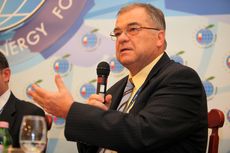Vienna Forum on European Energy Law unites leading energy experts,
16 Mar 2015

The 3nd Vienna Forum on European Energy Law took place
at the premises of the Energy Community Secretariat on 13 March. The Forum,
which is a joint initiative between the Florence School of Regulation and the
Energy Community Secretariat, brought together over 140 experts from energy companies,
regulators, governments, academia and legal firms. The motto of this year’s
Forum was “Markets and Crisis”. The programme included an analysis of the
market design for renewable energy, a focus on the energy hotspot – Ukraine, a
debate on the Energy Union as well as a review of enforcement in the Energy
Community.
In a keynote speech, Professor Helmut Schmitt von
Sydow, who chaired the intergovernmental conference that negotiated the Energy
Community Treaty, retraced the creation of the Community. He argued that in
many ways the Energy Community Treaty is more advanced than the EU’s treaties,
e.g. its mutual assistance clause in case of energy crisis and flexibility in
terms of accepting new members. Yet the Treaty also has its weaknesses,
including the absence of provisions on investment and an inadequate dispute
settlement mechanism. Today the Energy Community was playing a vital role in
the EU’s energy policy space, especially energy security. The future Energy
Union and its relevance to the Energy Community were assessed in the panel that
followed.
Experts discussed options to improve law enforcement
in the Energy Community, including the creation of a regional court of justice
of the Energy Community versus using arbitration tribunals. The former was
preferred as arbitration was generally very costly and a regional court could
deal not just with infringement cases but also have jurisdiction over direct
actions against the legally binding measures taken by the Energy Community
institutions and preliminary references for national courts of the Contracting
Parties. An EFTA Court already functioned in this manner under the Agreement on
the European Economic Area.
In a session that brought together leading experts on
Ukrainian energy policy, the Energy Community Secretariat’s pivotal role in
supporting reforms in Ukraine was recognised. Panellists agreed that 2015 would
be the year when all stakeholders would look towards Ukraine to implement its
reform commitments, including the Third Energy Package, corporatisation of
state-owned companies and the phasing out of energy subsidies. Panellist agreed
that financial assistance to the Energy Community Contracting Parties should be
conditioned on the implementation of the Energy Community acquis.
Deputy Director Dirk Buschle, who chaired the event
together with Leigh Hancher of the Florence School of Regulation concluded:
“One can doubt whether Adam Smith’s invisible hand works when there is a very
visible iron fist holding the energy markets in its grip. The Energy Union will
be successful if it manages to internalize the constant external risks to
Europe’s security of supply. It can and will have to build on the Energy
Community for this.”